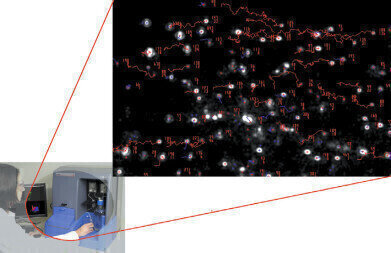News
The Most Versatile Tool for Nanoparticle Characterisation Now with Added Benefits
Apr 06 2011
NanoSight debuted the Zeta Potential Analysis applying Z-NTA, particle-byparticle characterisation of surface charge, at Pittcon.
Zeta Potential Nanoparticle Tracking Analysis (Z-NTA) adds measurement of surface charge to simultaneous reporting of size, composition (light scattering intensity), fluorescence and count. As with NTA, the core of NanoSight’s world-accepted nanoparticle measurement systems, it collects data on a particle-by-particle basis. No other methodology comes close to providing such simultaneous, multiparameter nanoparticle characterisation.
Zeta potential is measured particle-by-particle, simultaneously for the complete sample population to provide data that is number weighted not intensity weighted. Size and light scattering intensity are also reported. Polydisperse and complex suspensions are readily characterised. No labelling is required but a fluorescence mode option is available to further differentiate suitable-labelled sub-populations. All data sets are validated by real time observation of particles moving under both electrophoretic and Brownian motion.
The user benefits are clear to define. Variations in zeta potential with size are analysed with positively and negatively charged particles being reported separately even when they exist together. Sub-populations of similar sized particles of different materials, differentiated by their propensity to scatter light, are separately reported and counted. As with size distribution measurement, changes in Zeta Potential distribution with pH, concentration and temperature may be studied. Similarly, aggregation and flocculation may be studied quantitatively in real-time. Suitable labelling can highlight one sub-population for analysis despite high background noise. With applications transcending the life sciences through the materials sciences, NanoSight have installed more than 300 systems worldwide as NTA-based characterisation becomes increasingly accepted as the technique to quantitatively study nanoparticles.
Digital Edition
Lab Asia Dec 2025
December 2025
Chromatography Articles- Cutting-edge sample preparation tools help laboratories to stay ahead of the curveMass Spectrometry & Spectroscopy Articles- Unlocking the complexity of metabolomics: Pushi...
View all digital editions
Events
Jan 21 2026 Tokyo, Japan
Jan 28 2026 Tokyo, Japan
Jan 29 2026 New Delhi, India
Feb 07 2026 Boston, MA, USA
Asia Pharma Expo/Asia Lab Expo
Feb 12 2026 Dhaka, Bangladesh



















